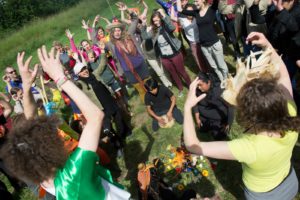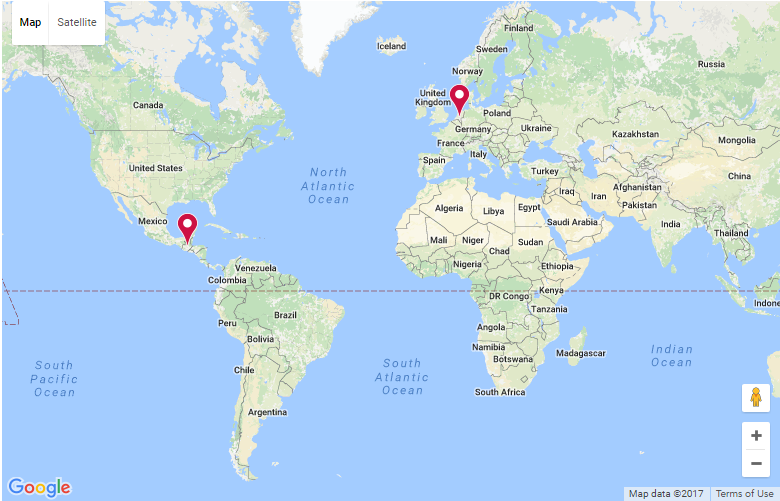Hidden War – Caja Lúdica
Hidden War – Caja Lúdica
The arts organization Caja Lúdica celebrates life with dance, music and theatre, to offer Guatemalan youths an alternative to gang violence. Community Arts Lab from Utrecht (CAL Utrecht) wanted to show Utrecht how an arts organization can successfully tie youths to it. During an E-Motive Exchange Foundation De Rest and Utrecht theatre maker Anouk de Bruijn from CAL Utrecht, made a play with Caja Lúdica about living with violence: ‘Hidden War’.
Description
Hidden War
The arts organization Caja Lúdica celebrates life with dance, music and theatre, to offer Guatemalan youths an alternative to gang violence. Community Arts Lab from Utrecht (CAL Utrecht) wanted to show Utrecht how an arts organization can successfully tie youths to it. During an E-Motive Exchange Foundation De Rest and Utrecht theatre maker Anouk de Bruijn from CAL Utrecht, made a play with Caja Lúdica about living with violence: ‘Hidden War’.
Giving youths hope and self-confidence
The war in Guatemala is over, officially, but violence and despair continue to simmer. Theatre maker Anouk de Bruijn visited Caja Lúdica on behalf of CAL Utrecht and sought its advice, to learn how the organization uses play techniques to give youths hope and self-confidence and step by step build their engagement. The project contributed to the international programme around the celebration of the Peace of Utrecht, in which CAL Utrecht participated. The Peace of Utrecht is the initiative of the council and the province of Utrecht, to mark 300 years of the signing of a historic peace.
Positive alternatives to gangsterism
Caja Lúdica organizes festive parades to inspire youths on the streets. They can also follow an intensive training and learn in turn how they can reach other youths. This peer-to-peer approach is very important when providing positive alternatives to joining a gang.
The play Hidden War was staged at the Community Arts Lab Festival, Art in the Frontline, in June 2013. It was a combination of the personal stories of youths from Guatemala City and those of Utrecht youths who had lived there for a while, for an internship, their studies or volunteer work. The E-Motive Exchange also consisted of workshops, such as the one for the University of Arts of Utrecht (HKU). Jonathan Offereins described the methodology in his bachelor essay, whilst Angie Hernandez Izquierdo recorded the exchange in a video documentary.
Personal life stories as basis for a play
Caja Lúdica taught the Dutch partners specific exercises, such as making stilts, moulding a parade and how to tie youths to you with a gradual build-up of activities. Caja Lúdica taught in particular how to use personal life stories as a basis for making plays.
Methodology network with European partners
The anniversary organization Peace of Utrecht no longer exists; but theatre maker Anouk de Bruijn wants to further develop the collaboration with Caja Lúdica, and will be looking for relevant exchanges in the town of Arnhem. One of Caja Lúdica’s actors gave a workshop, with the aid of E-Motive, at the International Community Arts Festival in Rotterdam. He has now been accepted to a Dutch dance training course. The people involved also developed a methodology network with European partners. Finally, foundation De Rest wants to set up a youth advisory council.
Method
Arts organization Caja Lúdica is able to offer youths an alternative to street gangs, in a country where violence and discrimination happen a lot. Caja Lúdica offers young people multi-annual development processes during which they can discover and develop their artistic talents.
Caja Lúdica celebrates life through song, dance and drama, and instils confidence and hope in youths. Through circus performances and exuberant street parades, it inspires other youths to join and end the spiral of violence and despair. Often youths join in and walk on stilts in self-made costumes. Peer-to-peer education plays an important part in Caja Lúdica’s approach.
Action, participation, transformation
Caja Lúdica uses cultural activities to encourage youths to start actions. When they show enthusiasm they can participate. Anyone who participates gets a thorough education in song, dance and drama, but also in yoga and Maya history. Young people thus develop suppressed talents and qualities, but also their self-awareness and an understanding of what is happening in their society. They learn how to be vulnerable, instead of adopting violence as a screen to hide their insecurity. They can thus transform themselves. The bonds that thus grow between youths reinforce their ability to resist the influence of street gangs.
Margreet Bouwman, project leader CAL Utrecht:
“It is notable that Latin American arts organizations emphasize the collective to improve the world.”
Members of the audience:
“Being part of a group has liberating effects, maybe because life hasn’t been too kind on you.”
“Impressive performance! Touched, especially by the combination of people’s lives in Guatemala and the passionate students from the Netherlands. Feeling alive amongst so much death.”
“Thank you very much. Thank you for your courage to do and be who you are. Thank you for your commitment, for the change and the renewal. Thank you for your dedication and inspiration.”
Partners
Peace of Utrecht
The Peace of Utrecht – a world encompassing peace treaty – was signed in Utrecht in 1713. In 2013 300 years of the Peace of Utrecht were celebrated in a grand style. The foundation Peace of Utrecht and countless other organizations fleshed out this celebration in the city and province of Utrecht. The foundation thus strengthened the (inter)national reputation of Utrecht as a city and region with knowledge and culture with an appealing cultural programme for 2013. Peace of Utrecht aimed at contributing to enhancing the cultural outreach in Utrecht City and Province. After the celebrations of 2013 the organization ceased to exist.
Caja Lúdica
Caja Lúdica literally Playful Box. It was born as a social and cultural non-profit civil organization during the Blue October Festival of 2000 in Guatemala City. It gives shape to the social responsibility of young people from different economic backgrounds and academics, through a comprehensive training and by raising their cultural awareness, so as to consolidate peace and co-existence.
Foundation De Rest
Foundation De Rest is made up of a theatre school and a theatre workshop in the Vecht region and Utrecht City. De Rest works with young amateurs and combines location theatre with community art.
De Rest is located in the former fire station of Maarssen. At the school De Rest provides courses and workshops to children, youths and young adults. At the workshop De Rest develops and organizes theatre productions, bespoke plays and (international) theatre exchanges.
The courses, workshops and bespoke plays emphasize the process. Core words are arts education, talent development, training and team building. The theatre productions and (international) theatre exchanges emphasize the making of an artistic product. But in all activities the meeting with oneself, the other and the world takes centre state. This meeting teaches one to live life with awareness, and De Rest encourages the person to be socially involved.
Community Arts Lab Utrecht
The Community Arts Lab of the Peace of Utrecht is a centre of expertise for community arts. CAL Utrecht does research, shares knowledge and maintain (inter)national partnerships. CAL Utrecht operates in the city and province of Utrecht is the forerunning of the national CAL-XL.
Eugène van Erven co-ordinates CAL Utrecht’s research activities. He has been researching theatre and social development since 1980.
After the celebrations of the Peace of Utrecht in 2013, Community Arts Lab Utrecht also ceased to exists.
HKU
The Utrecht University of the Arts distinguishes itself from higher level of education, in the sense that arts and the media are a driving forces in education and innovation for the creative industry. HKU is a university of arts, which uses arts and the practice of arts to forge new linkages with society and develop innovative applications for social expression.
The HKU has about 4,000 students and eight schools: Visual Arts, Design, Music and Technology, Games and Interaction, Arts and Economics, Media, Utrecht Conservatory and Theatre. HKU has four centres of expertise that link education and research into various issues. HKU is located in Utrecht, Hilversum and Amersfoort.

Contact Details
Vrede van Utrechtthis organisation has been lifted |
Caja LudicaJ. Escobar |
